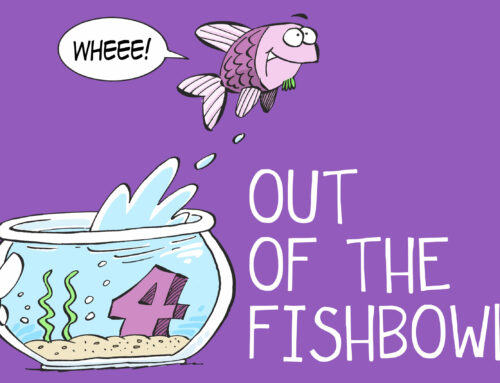“Are we the baddies?” asks David Mitchell’s character in this hilarious sketch – from ‘That Mitchell and Webb Look’ – after he discovers a skull is the symbol on his cap.
That is often the question that tbV and myself ask each other after receiving huge pushback in the Justice spaces, from friends or church or random strangers on the internet. That’s often my reflection after i have just typed “You’re being a bit of a dick!” after being monumentally frustrated by someone commenting who really doesn’t seem to be listening or invested in the conversation beyond being or looking right.
We absolutely have to keep returning to the mirror and reflecting on who we are and how we are doing life, as one of the biggest threats is that we start to become the very thing we are campaigning against.

How to step away from your inner Troll
To that end, i have come up with a few ideas and thoughts that might help each of us as we reflect at the end of the day as to how we are doing in this regard. i would love to hear more ideas so please share below, but these are the ones that came to mind.
[1] Be slow to Insult
i imagine better minds than mine would probably have ‘Don’t insult!’ as the point here, and that really is the higher ground and the better way to go. However, after lengthy back and forth and at the moment i have realised we really are not going to move beyond the present stalemate of non-engagement i do have moments of slipping to that.
But this is the point. The moment you insult someone directly [instead of attacking their argument] you have pretty much stepped out of a positive engagement. i was involved in a back and forth with someone who supported the DA on the Twitterer yesterday and every tweet he included an insult like “lame ass” or “Are you stupid?” and worse. That was the point that i realised continuing was not going to be helpful for him [although i need to write a piece about my audience theory because audience is everything!] and time to move on.
If you have a strong argument and you are confident about what you are saying, there is no need to insult the person you are engaging with. The proverb ‘Don’t raise your voice, raise your argument’ is a useful one here, because everything else is misdirection and distraction.
It is not always easy to hold to that one, because people [especially anonymous people] can be so triggering. But if you want to make a difference in these spaces, other people are always watching and so build your self-control in this area. Or take a social media break if needed.
[2] Be slow to Meme
This is another area which feels like the domain of the person with a weak argument. And again, there might come a certain point in the conversation where you realise that the person is not seriously going to consider what you are saying and is just wasting your time because they enjoy the argument and that might feel like the perfect time to drop a good meme or gif.
But, as with insulting, the moment you meme/gif in most cases, you are signalling that serious conversation has ended. Same principle as before – come up with a better argument, not a funny or insulting meme.
Having said that, i have two favourite gifs which are my go-to when there is a need to signal anger at what has just been suggested:
My other go-to winner is Tom Cruise sharing my innermost feelings when someone says something so ridiculous that words fail me:
So as fun as it may be to whip out your favourite, let this be another last resort drop so that you can at least feel like you won some kinds of moral victory. But when i see a meme or gif, it typically indicates serious engagement has ended.
#3 Accountability is King!
People you don’t know so well will often give you feedback whh might make you doubt yourself. Because no matter what stance you are taking on what thing, you are likely to be upsetting someone you know and care about. So when they drop you an inbox message or a whatsapp or voice not telling you that your latest post or comment was not cool, it can really make you doubt yourself.
Listening to external feedback is important. i would say crucial. Especially from your detractors because if you are someone who is trying to grow and become a better person, there is often good stuff to learn there. But i would encourage having a group of people [that might include spouse and family member and best friend but also contain some people who you deeply respect but who think differently from you]. Accountability for me is not so much about needing to hear whether i was right or wrong with what i said. But it’s about hearing outside reflection on how i said it.
This speaks to character. i don’t always want to be right [okay, let’s be honest, i’m pretty competitive, i ALWAYS want to be right!] BUT i do want to be a person of integrity. And i fail in this often. But when i do, i want it to be people i trust and have no doubt that they love me, telling me that this is so. And believe me they do.
Think of it like a circle, where the further out you are the less intimate relationship you have with me and the less weight your voice carries in my life. But there are a number of people who i have directly asked to hold me accountable on social media and in life. These are people i check in when i am not sure about something and also those who feel like they have the right to call me on something when i get it wrong. This kind of support is so valuable espeially if you use social media to try and engage with people around race and justice issues.
Do you have people in your life who you have actively asked to hold you accountable? Are there people who know they have the right to message you if they see you saying or doing something out of line with your character?

The Final Reflection
#4 Gaze Deeply ino the Mirror Regularly
Whenever i read the comments – you know, the ‘Don’t read the comments!’ type – or see someone being particularly deeply mean or hurtful on social media, my reflection is this: How do you look in the mirror before you go to bed at night and think to yourself, “Well done, buddy, winning at life!”
i honestly can’t understand how messed up a life must have been to move a person to the place where they can sit and type in some of the words you then read on your screen. it’s just beyond me. But i always have to wonder if someone has read words that i have typed and asked the same question…
At the end of each day, when i climb into bed, i want to be able to look myself in the mirror and say, “Well done, today. You tried to make the world a better place, especially for the poor and marginalised in the world.”
On some days, that is a lot more true than it is on other days. But this is something to work into your teeth-brushing schedule as one of the last things you might do before heading to bed. Look in the mirror and ask yourself, “Was I kind today? Did I fight for Justice? Did I say/write anything to someone that was across the line? Is there someone I maybe need to apologise to? Am I happy with how I conducted myself today? Am I a better person based on today’s events than I was yesterday?”
It doesn’t have to be as official and formulaic as that. But having some kind of regular check-in with yourself, or sometimes with your accountability people, can be a helpful heathy thing
De-Troll Yourself
Do the people we think are Trolls not know or just not care? It’s hard to know. i believe that no person is beyond redemption and so i will continue to try and return to the place of kindness and compassion and slow-to-anger’ness where i tend to do a lot better. And hopefully have more patience and self-control at the start of tomorrow than i had at the end of today.
What points would you add to this list? What are some other ways that those of us who engage regularly with these things can put in place to help us maintain character and integrity and have a better chance of being a catalyst for change? Please share your thoughts in the comments below.









Leave a Reply